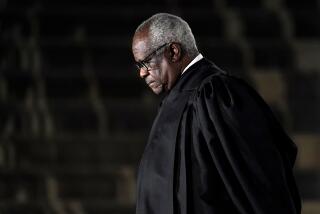Wrath of Scalia on Honorarium Story
- Share via
WASHINGTON — Justice Antonin Scalia is known for firing verbal shots at his Supreme Court colleagues. Now, he’s found a new and equally appealing target: a legal reporter who writes about the business of the high court.
Two weeks ago, Tony Mauro, a reporter for the weekly Legal Times, wrote about a move in Congress to lift a ban that prevents judges from accepting honorariums, including payments for giving speeches. Some congressional staff members called it the “Keep Scalia on the Court” bill, speculating that the 64-year-old justice and father of nine might quit if he could not earn more money. The article included a comment from an anonymous judge saying that “Scalia’s the only one who talks about” wanting to earn more honorariums.
In a letter published Monday, Scalia fired back and called the article “gossipy, titillating and characteristically Mauronic.”
The justices now earn $173,600 a year, and they can pick up as much as $21,195 more through teaching.
Scalia said that lifting the honorarium ban is “a good idea” but that it would not affect him because he already earns the maximum $21,195 extra by teaching. Moreover, he said, he has no interest in leaving the court. If money concerns drove him, Scalia said, he would not have taken a pay cut to become a U.S. appeals court judge back in 1982, when his children were young.
“The notion that one who was so indifferent to financial gain [then] . . . should contemplate resigning from the Supreme Court for financial reasons now that the last child is in her junior year [in college] is on its face absurd,” Scalia wrote. “Only someone intent on writing a slanted story would assert it.”
The Senate approved the lifting of the honorarium ban as a part of a spending bill, but the House did not go along. The issue is now being considered by a House-Senate conference committee. Chief Justice William H. Rehnquist told the lawmakers that he would prefer an across-the-board salary hike for judges.
For his part, Mauro called the letter “typical Scalia,” noting that the justice had refused to comment on the story when he was working on it. “My name hasn’t been made fun of since fourth grade,” he added.
More to Read
Get the L.A. Times Politics newsletter
Deeply reported insights into legislation, politics and policy from Sacramento, Washington and beyond. In your inbox twice per week.
You may occasionally receive promotional content from the Los Angeles Times.











